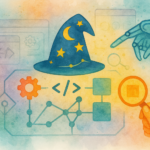Frontend development is evolving faster than ever, driven by new technologies, changing user expectations, and AI-powered tools that are redefining how we build and interact with applications. What does the future hold for frontend developers? Here’s a look at the key trends shaping the next generation of web and app development.
1. AI-Powered Development Assistants
AI is no longer just an experimental feature—it’s becoming an essential tool in frontend workflows. With AI-driven code generation, intelligent debugging, and automated UI design suggestions, developers can focus on creativity and problem-solving rather than repetitive coding tasks. Tools like AI agents for frontend development will soon act as real-time coding partners, optimizing performance and suggesting best practices.
2. The Rise of No-Code & Low-Code
No-code and low-code platforms are lowering the barrier to entry for building interactive applications. While they won’t replace traditional development, they will augment frontend teams, allowing them to prototype faster and automate repetitive components. Expect deeper integrations between no-code tools and modern frontend frameworks, enabling a hybrid approach where developers fine-tune what automation generates.
3. WebAssembly and the Future of Performance
WebAssembly (Wasm) is set to revolutionize frontend performance by allowing developers to write high-performance applications in languages like Rust, Go, or C++. This means faster web applications with near-native performance, unlocking new possibilities for web-based gaming, data visualization, and high-performance tools right in the browser.
4. Component-Driven & Micro-Frontend Architectures
The shift toward component-based development is accelerating, with frameworks like React, Vue, and Svelte leading the way. Micro-frontends take this a step further, enabling large teams to work on independent frontend modules that seamlessly integrate, improving scalability and maintainability for enterprise-level applications.
5. Enhanced Developer Experience (DX)
Tools and frameworks are evolving to prioritize developer experience. Expect advancements in hot reloading, AI-assisted debugging, and real-time collaboration tools that make development faster and more enjoyable. New CSS methodologies, design systems, and accessibility-first frameworks will also streamline frontend workflows.
The Future is Fast, Smart, and Modular
Frontend development is heading toward a more efficient, AI-augmented, and component-driven future. Developers will increasingly work alongside AI tools, leverage automation where possible, and embrace high-performance technologies like WebAssembly.
The best part? The frontend landscape is only getting more exciting. Whether you’re a developer, designer, or product lead, now is the time to adapt, experiment, and build the next generation of user experiences.



